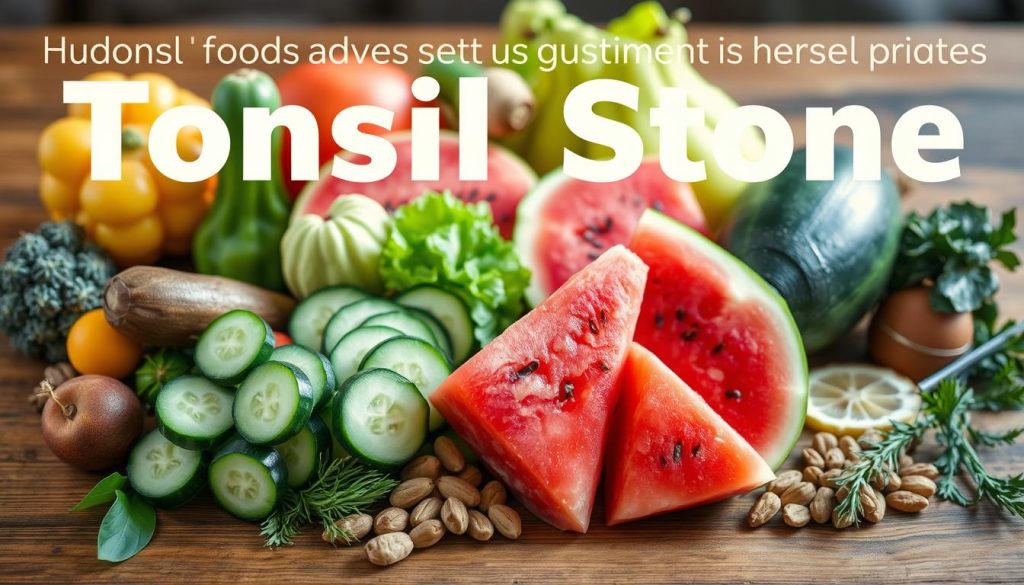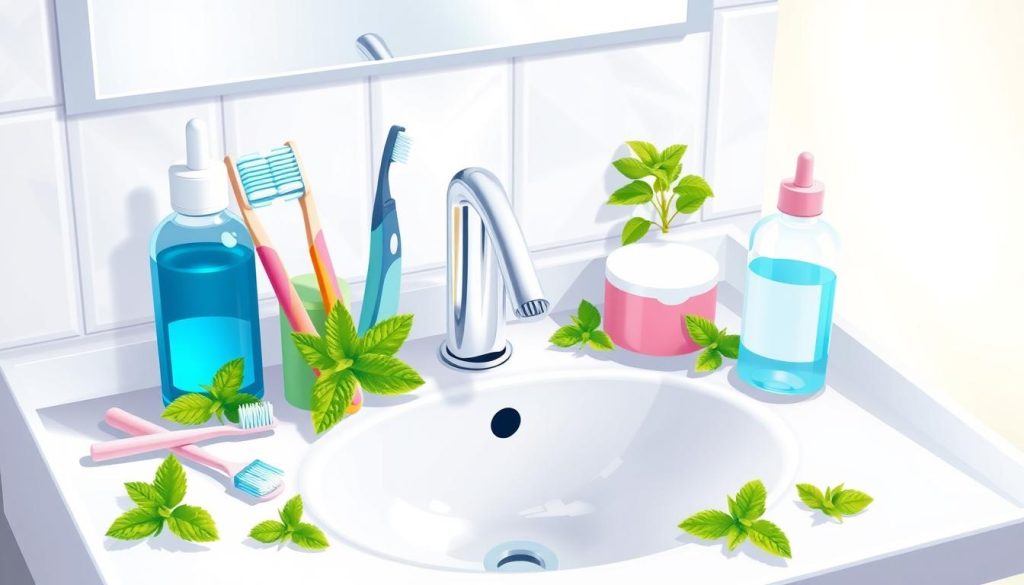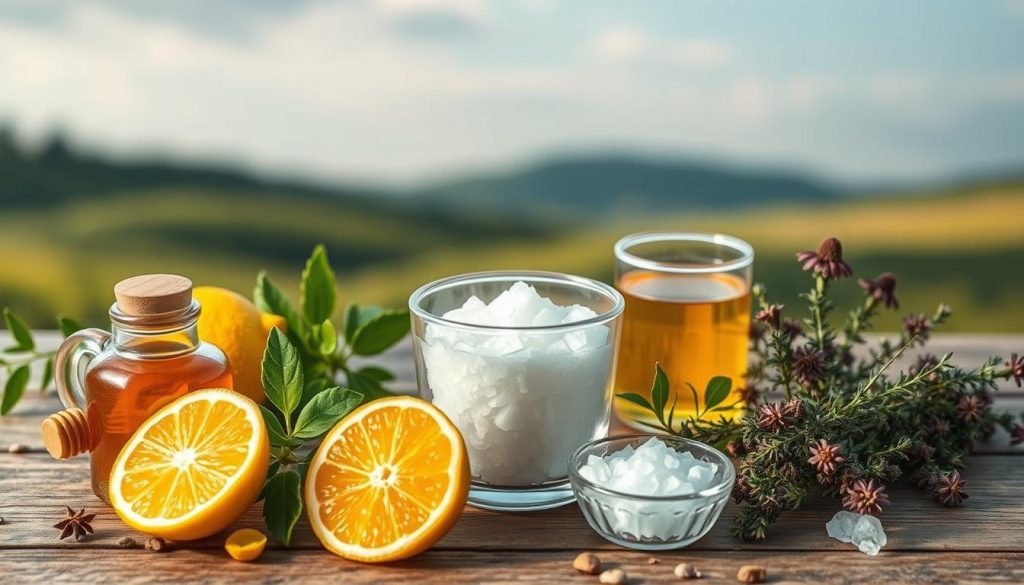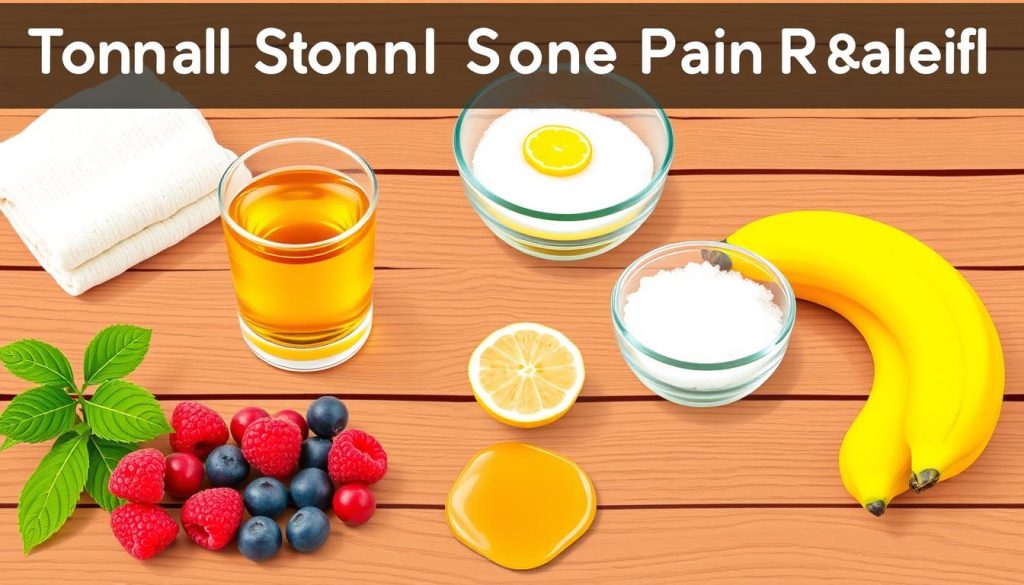Dealing with tonsil stone pain can really disrupt your day. It’s a discomfort that can make everyday activities hard. But, there are ways to find tonsil stone pain relief and get back to feeling better.
Exploring managing tonsil stones reveals many options. You can try simple home remedies or seek professional tonsil stone treatments.
Get ready to learn about symptoms, first steps for relief, and home remedies. We’ll also talk about when to see a doctor. Understanding the cause and the available solutions is key to managing tonsil stone pain.
Understanding Tonsil Stones and Associated Pain
Tonsil stones, also known as tonsilloliths, are small, calcified deposits in the tonsils’ crevices. They form at the back of the throat. These formations are common in people with chronic inflammation or recurrent tonsillitis. Knowing the causes of tonsil stones and recognizing tonsil stones symptoms helps manage their discomfort.
What Are Tonsil Stones?
Tonsil stones form when debris like food, dead cells, and bacteria gather in tonsillar crypts. This material can calcify, forming stones of varying sizes. Many people have tonsil stones without knowing it, leading to discomfort and symptoms.
Why Do Tonsil Stones Cause Pain?
The pain from tonsil stones comes from the inflammation they cause in the throat’s sensitive lining. As stones grow, they press on surrounding tissues, making pain worse. Knowing the causes of tonsil stones is key to preventing and treating symptoms.
| Size of Tonsil Stone | Symptoms |
|---|---|
| Small ( | Mild discomfort, slight foul smell |
| Medium (2mm-5mm) | Moderate pain, bad breath, sore throat |
| Large (>5mm) | Severe pain, difficulty swallowing, noticeable swelling |
Spotting these tonsil stones symptoms early is key to managing and treating them. Regular dental visits and good oral hygiene can help prevent them.
Identifying Symptoms of Tonsil Stone Pain
Recognizing tonsil stone pain is key to managing daily life. Knowing the symptoms of tonsil stones is vital. These signs help you know when to see a doctor.
Common symptoms include a sore throat that won’t go away and feeling like something is stuck in your throat. These are common complaints from people with tonsil stones. Let’s look at each symptom in more detail:
- Sore Throat: A throat that hurts all the time, even after trying usual remedies.
- Difficulty Swallowing: Feeling pain or discomfort when swallowing, often on one side.
- Bad Breath: Caused by the decay of hidden debris in the tonsil stones.
- Ear Pain: Pain in the ear due to the connection between throat and ear nerves.
For early detection, watch these symptoms closely. Learn more at common signs and symptoms of throat issues.
Spotting these symptoms early can lead to easier treatments. Being aware of these signs is a big step in managing pain and preventing worse health problems.
In summary, being alert to tonsil stone symptoms is important. It helps in early detection and avoiding complications. If you notice these symptoms, see a doctor for a check-up and treatment.
Initial Steps to Take When Experiencing Tonsil Stone Pain
When tonsil stone pain hits, knowing how to treat it right away can help a lot. The pain from tonsil stones can be sharp and intense. So, finding immediate tonsil stone pain relief is very important.
Here are some quick steps to ease the pain and think about long-term solutions:
- Gargle with warm saltwater to soothe irritation and reduce swelling.
- Apply cold compresses externally on the neck area to help numb the pain.
- Use over-the-counter pain relievers like ibuprofen or acetaminophen to manage the discomfort effectively.
- Hydrate consistently to help flush out smaller stones and aid in recovery.
While these steps can help for now, they are just the start. You might need a more detailed plan to handle tonsil stones for good.
| Action | Brief Description | Effectiveness |
|---|---|---|
| Gargling Saltwater | Reduces swelling and cleanses the throat | High |
| Cold Compress | Numbs the area, reducing pain | Medium |
| Pain Relievers | Reduces overall discomfort | High |
| Hydration | Helps flush out stones naturally | Variable |
Starting these steps quickly can make you feel better and help with initial tonsil stones treatment. Always talk to a doctor for a treatment plan that fits your needs.
Home Remedies for Soothing Tonsil Stone Pain
Looking for tonsil stones home treatment? Natural methods can help without a doctor’s visit. This section shares two natural remedies for tonsil stones. They ease pain and fight bacteria from home.
Salt Water Gargles: A Simple Solution
Gargling with saltwater is a simple, effective way to ease tonsil stone pain. Salt’s antimicrobial properties help reduce swelling and loosen stones. Doing this twice a day can bring a lot of relief.
Garlic: Nature’s Antibiotic
Garlic is more than just a flavor enhancer; it’s a natural antibiotic. It contains allicin, which fights bacteria causing tonsil stones. Eating raw garlic daily can help prevent new stones and ease pain.

| Remedy | Benefits | Frequency |
|---|---|---|
| Salt Water Gargle | Reduces inflammation, can help dislodge stones | Twice daily |
| Garlic | Antibacterial, prevents new stone formation | Daily |
Tonsil Stone Pain: When to See a Doctor
Knowing when to get a medical consultation for tonsil stones is key if home treatments don’t work. There are clear signs that mean you should see a tonsil stones doctor visit. Spotting these signs early can stop problems and help you get better faster.
Severe or persistent pain in your throat, trouble swallowing, or bigger tonsil stones are warning signs. Also, bad breath that doesn’t get better with brushing and flossing might mean an infection that needs a doctor’s check.
- Unbearable pain in the throat
- Difficulty swallowing
- Bad breath despite good oral hygiene
- Visible increase in stone size or quantity
If you’re feeling these symptoms, make an appointment with your doctor right away. Getting help early can avoid more serious treatments and bring quick relief.
| Symptom | Home Remedy Response | Recommended Action |
|---|---|---|
| Severe throat pain | Minimal relief with gargles | Seek medical consultation for tonsil stones |
| Difficulty swallowing | No improvement with hydration | Visit a throat specialist |
| Bad breath | Persists despite oral care | Consult your dentist or doctor |
| Increased stone size | Visible and causing discomfort | Immediate tonsil stones doctor visit |
It’s always best to talk to experts who can create a treatment plan just for you. This way, you get relief from symptoms and fix the problem of tonsil stones.
Medical Treatments for Tonsil Stones and Pain Relief
New medical treatments have changed how we deal with tonsil stones. They make it easier to manage pain and stop stones from coming back. Laser tonsil cryptolysis and coblation cryptolysis are top choices. These methods are not too invasive but get the job done well.
Laser Tonsil Cryptolysis
Laser tonsil cryptolysis is a precise way to tackle tonsil stone problems. It uses a laser to remove the small pockets on the tonsils where stones form. This method is gentle, so you heal faster than with old-school surgery. It’s great for those who want a less invasive way to get rid of tonsil stones.
Coblation Cryptolysis
Coblation cryptolysis works by using radiofrequency energy to remove tonsil tissue and stones. It not only gets rid of stones but also makes it harder for them to come back. People usually feel little pain and heal quickly, making it a top pick for lasting relief.

Both treatments are great for those with chronic tonsil stones and pain. By going for these professional treatments, you can live better with fewer stone problems.
Pros and Cons of Surgical Tonsil Stones Removal
Thinking about tonsillectomy for tonsil stones means looking at both sides. This surgery aims to stop tonsil stones from coming back. It also helps with the pain and discomfort they cause. But, it’s important to know the good and bad before deciding on surgical removal of tonsil stones.
- Permanent Resolution: A tonsillectomy stops tonsil stones from coming back. It removes the tonsils, where stones form.
- Reduction in Bad Breath: This surgery also cuts down on bad breath. It removes the source of bacteria that causes it.
- Improved Oral Health: Taking out the tonsils can make your mouth healthier and cleaner.
But, there are also risks and things to think about with tonsillectomy for tonsil stones:
- Recovery Time: You’ll need a lot of time to get better after surgery. You might feel pain and discomfort.
- Risks of Surgery: Like any surgery, there are dangers. These include bleeding, infection, and reactions to anesthesia.
- Potential for Other Health Issues: Removing tonsils might make you more likely to get infections and other immune problems.
| Benefit | Risk |
|---|---|
| Permanent removal of tonsil stones | Recovery time and post-op pain |
| Reduction in chronic bad breath | Risks of bleeding and infection |
| Improved overall oral hygiene | Potential increase in other infections |
In conclusion, choosing to have a surgical removal of tonsil stones needs careful thought. It’s best to talk to a healthcare expert who knows about this treatment. For those with ongoing tonsil stones and symptoms, surgery might be a good long-term fix. But, it’s key to know all about it before making a choice.
Dietary Adjustments to Prevent Tonsil Stones
Looking into the right diet to stop tonsil stones is key for good oral health. Knowing how some foods can lead to tonsil stones is vital. We’ll explore the best nutritional changes to stop tonsil stones and how to add them to your daily meals.
Altering Eating Habits
Small changes in what you eat can help a lot in preventing tonsil stones. Drinking more water and eating less dairy are good starts. Dairy can make more mucus, which might cause stones. Drinking water keeps your throat clean and free from bacteria.
Foods to Avoid
- Dairy products: They can make more mucus, leading to stones.
- Sugary foods and drinks: They help bacteria grow in your mouth and throat.
- Processed snacks: They’re full of unhealthy fats and additives, harming your oral health.
While avoiding bad foods, eating more fruits, veggies, and whole grains is good. These foods keep your mouth clean and reduce stone chances.

By making these diet changes and keeping up with good oral hygiene, you can fight tonsil stones better. Knowing and using these tips can help you keep your mouth and body healthy.
Hydration and Tonsil Stone Prevention
Drinking enough water is key to stopping tonsil stones from forming. By drinking water, you get many benefits, including better oral health. Water helps clean your mouth and throat, keeping them free from harmful bacteria and debris.
- Enhances Saliva Production: Drinking lots of water makes your body produce more saliva. This helps wash away food and bacteria from your mouth and throat.
- Dilutes the Build-up of Materials: Water also makes the materials in your saliva less likely to form stones. This includes things like calcium and phosphorus.
- Prevents Dry Mouth: Drinking enough water keeps your mouth moist. This is important because dry mouth can make tonsil stones worse by not having enough saliva.
Drinking water regularly is not just good for staying hydrated. It also helps lower the chance of getting tonsil stones.
Oral Hygiene Tips to Prevent Tonsil Stone Formation
Keeping your mouth clean is key to avoiding tonsil stones. Good dental habits help by removing food and bacteria from your tonsils. This stops stones from forming.
Proper Brushing and Flossing Techniques
Brushing twice a day and flossing often are essential. Make sure to brush all your teeth, including the back and tongue. This helps get rid of bacteria that can cause tonsil stones.
- Use a soft-bristled toothbrush to avoid irritating the gums.
- Replace your toothbrush every three months or sooner if the bristles are frayed.
- Floss daily to remove food particles and plaque from between the teeth and along the gum line.
Using Mouthwash Effectively
Mouthwash can boost your oral care. It reaches areas brushing and flossing might miss. Choose an antibacterial mouthwash to fight bacteria that cause tonsil stones.
- Choose a mouthwash with fluoride to help protect against tooth decay.
- Swish the mouthwash in your mouth for at least 30 seconds to ensure full coverage.
- Use mouthwash after brushing and flossing to optimize cleanliness.
| Technique | Description | Benefits |
|---|---|---|
| Brushing | Use a soft brush, gentle circular motions | Removes plaque, prevents bacterial growth |
| Flossing | Daily flossing, gentle on the gums | Removes food particles and plaque |
| Mouthwash | Antiseptic types, use post brushing | Reduces bacteria, freshens breath |
Sticking to these dental habits prevents tonsil stones and keeps your mouth healthy.

Practical Lifestyle Changes to Reduce Tonsil Stone Recurrence
Making smart lifestyle modifications is key to reducing tonsil stones naturally. Changing what you eat, how you move, and your environment can really help. Here are simple steps to add to your daily routine and keep your tonsils stone-free.
- Stay hydrated: Drinking more water helps clear out bacteria and debris from your mouth and throat. This stops stones from forming.
- Reduce dairy intake: Dairy can lead to mucus and calcium build-up, which are parts of tonsil stones. Eating less dairy can lower your risk.
- Quit smoking: Smoking dries out your mouth and increases bacteria, both of which can cause tonsil stones.
- Maintain good oral hygiene: Brushing twice a day and using a mouthwash without alcohol can kill bacteria that might cause stones.
- Consider changing your toothpaste: Some toothpastes might make tonsil stones worse. Try a natural or herbal one instead.
These lifestyle modifications do more than just fight reducing tonsil stones naturally. They also boost your overall mouth and throat health. For those who often get tonsil stones, making these changes can greatly improve your comfort and health.
Addressing Chronic Tonsil Stone Pain Through Long-Term Strategies
For those dealing with tonsil stones often, finding long-term relief from tonsil stones means using many strategies. It’s not just about treating the symptoms. It’s also about stopping them from coming back through diet, hygiene, and doctor visits.

Changing your diet is key. Eating less dairy and foods that grow bacteria can help stop tonsil stones. Drinking lots of water also helps by cleaning out your mouth.
- Increased water intake
- Limiting sugar-rich foods
- Reduction in dairy products
Good oral hygiene is also vital for chronic tonsil stone management. Brushing twice a day, flossing, and using mouthwash are musts. This helps get rid of any stuck debris in your tonsils.
- Brush teeth regularly with fluoride toothpaste
- Use floss or interdental brushes to clean between the teeth
- Gargle with an antibacterial mouthwash daily
Seeing your doctor regularly is also important. They can check if your prevention plans are working. Sometimes, treatments like cryptolysis or tonsillectomy might be needed for severe cases.
| Treatment Option | Frequency | Effectiveness |
|---|---|---|
| Antibacterial Mouthwash | Daily | High |
| Cryptolysis | As needed | Medium to High |
| Tonsillectomy | Once (if applicable) | Very High |
By using these strategies together, you can get long-term relief from tonsil stones. This improves your oral health and life quality. Tonsil stones don’t have to be a constant problem with the right care and treatments.
Tonsil Stone Pain and Its Impact on Quality of Life
Tonsil stones can be more than just a minor health issue. They can really disrupt daily life for many people. The effects of tonsil stones on daily life go beyond just pain and discomfort. They can also affect how we interact with others and our emotional well-being.
Those dealing with tonsil stone discomfort often struggle in their personal and work lives. This is mainly because of the bad breath that comes with it. It can make people feel shy, anxious, and even lead to them staying away from social events.
The pain from tonsil stones can also make it hard to focus and be productive. It can distract people all day, making it tough to do well at work or school. This can lead to a search for ways to fix the problem and might even mean going to the doctor.
It’s important to understand how tonsil stone pain affects our lives. Taking steps to prevent it, keeping our mouths clean, and seeing a doctor when needed are key. By doing this, we can improve our health and enjoy life more without the worry of oral health problems.
FAQ
Q: What are tonsil stones and how do they develop?
A: Tonsil stones, also known as tonsilloliths, are small, hard deposits in the tonsils. They form when food, bacteria, and dead cells get trapped and harden in the tonsil’s crevices.
Q: Why do tonsil stones cause pain?
A: The pain from tonsil stones comes from their size and pressure on the tissue. Inflammation and infection can also cause sore throats, swallowing trouble, and discomfort.
Q: How can I recognize the symptoms of tonsil stone pain?
A: Signs of tonsil stone pain include a sore throat, feeling something stuck, swallowing trouble, ear pain, and bad breath. You might see the stones when you look at your tonsils with a mirror and light.
Q: What immediate actions can I take if I’m experiencing tonsil stone pain?
A: For quick relief, gargle with warm saltwater to reduce inflammation and dislodge stones. Over-the-counter pain relievers can also help. If pain persists, see a healthcare professional.
Q: Can certain home remedies soothe tonsil stone pain?
A: Yes, home remedies like saltwater gargling or a garlic rinse can help. They reduce infection and inflammation, easing pain.
Q: When should I see a doctor for tonsil stone pain?
A: See a doctor if stones cause frequent pain, discomfort, or infections. If you can’t remove them yourself, an ENT specialist can help.
Q: What are the medical treatments available for tonsil stones and pain relief?
A: Treatments include Laser Tonsil Cryptolysis and Coblation Cryptolysis to prevent stone formation. For severe cases, a tonsillectomy may be needed to remove the tonsils.
Q: What dietary adjustments can help prevent tonsil stones?
A: Eating less dairy, sugar, and processed foods can help. Drinking more water and eating roughage keeps the tonsils clean.
Q: How does hydration help prevent tonsil stones?
A: Drinking water helps keep saliva flowing, flushing out bacteria and particles. It’s good to drink water after meals to prevent stones.
Q: What oral hygiene tips can prevent tonsil stone formation?
A: Good oral hygiene, like brushing twice a day, flossing, and using mouthwash, removes food and bacteria. This prevents stones from forming.
Q: What lifestyle changes can reduce the recurrence of tonsil stones?
A: A healthy lifestyle, like less alcohol, quitting smoking, and good oral hygiene, lowers the risk. Regular dental check-ups are also key.
Q: What long-term strategies are effective for managing chronic tonsil stone pain?
A: Long-term, keep up with oral hygiene, eat right, and see an ENT specialist regularly. This helps manage ongoing issues.
Q: How can tonsil stone pain affect my quality of life?
A: Tonsil stone pain can make social interactions hard due to bad breath. It can lower confidence and cause anxiety, affecting your life quality.


















